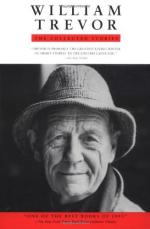|
This section contains 2,367 words (approx. 8 pages at 300 words per page) |

|
SOURCE: Bonaccorso, William. “William Trevor's Martyrs for Truth.” Studies in Short Fiction 34, no. 1 (winter 1997): 113-18.
In the following essay, Bonaccorso emphasizes the moral nature of Trevor's short fiction.
In a 1989 Paris Review interview, William Trevor speaks of his fascination with the focusing power of the story form: “I like the whole business of establishing its point,” he states, “for although a story need not have a plot it must have a point” (Stout 143). The point in Trevor's stories appears to be of a moral nature. Indeed, one could call them “moral mysteries.” His typical tale builds through a series of concealments and partial apprehensions, until, with details and identities established, moral truths, or more precisely, moral implications that emanate from truths, begin to resonate, forming the story's ending. But because he takes such pains to avoid the didactic, and because he seems to have such respect for the...
|
This section contains 2,367 words (approx. 8 pages at 300 words per page) |

|


